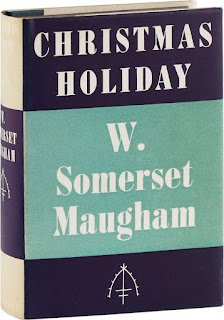Christmas Holiday
William Somerset Maugham, 1939
I had been reading a number of brand new holiday books that feel as though the authors hope they'll be turned into movies, so I felt like switching gears to try a much older book that was actually adapted for film.
If you read our review of the movie, you may remember that Erin mentioned that a lot of aspects were changed in the adaptation. The largest is that in the movie, the main female character gets the most emotional development, and her story, told mostly in flashback to the ostensible point-of-view lead, gets the most screen time.
The novel, on the other hand, actually has a main character. Charley Mason is not an American GI with anger issues, but a British dilettante. His wealthy parents have pretensions of being knowledgeable about art, and at one time he wanted to be an artist himself. At the time of the novel, he's been talked out of that, and instead, he has been preparing to take over his father's safe, sensible job for (if I understood correctly) the family real estate firm.
His reward for being sensible is a holiday alone in Paris over Christmas. Charley has plans to meet up with an old school friend, stay in a bohemian district, attend shows and museums, and generally have a romantic, exciting time.
Instead, he finds a lot more than he bargained for. His old friend, always a bitter revolutionary, has become deeply misanthropic and downright frightening in his beliefs. (There is at least a slight implication that the friend might be attracted to Charley and hate himself for it, but it isn't explored further.)
He introduces Charley to Lydia at a brothel. (Side note: a woman dances with a topless female prostitute in this scene, echoed by the women dancing together in the film.) Similar to in the film, Charley is drawn to her and they attend midnight Christmas mass together, then stay up talking, first at a restaurant, then back at his hotel. She tells him her whole story about her doomed romance, her husband's crimes and how they were eventually uncovered. She's still deeply in love with her husband, although she is sure he doesn't feel strongly about anything but himself. Charley is shaken by her love, it seems to him to be altogether different than any kind of love he's felt.
Lydia and Charley spend his entire holiday together. They do attend a concert of a sort, and visit a museum, but Charley's experience is very different than he expected. There is no dramatic climax as in the film; this is a movie in which, ostensibly, very little happens, but the very little that happens is enough to undermine everything that a "nice," "normal," upper-middle-class guy like Charley believes about society and life. It's an example of using Christmas as a time to really see where society is failing, how people are suffering. Charley is at a tipping point, having seen the plight of Lydia and other Russian refugees, having heard his friend's fascist fantasies. The tension is unresolved, left hanging in the air by the end, as it would have been in 1939.
I really enjoyed reading it, even though I usually dislike slow, meandering books. It's not a happy story, its about growing up for real, seeing beneath a facade to real trauma and hardship with no solution.



Comments
Post a Comment
FYI: Most comments are moderated, and will not appear immediately.